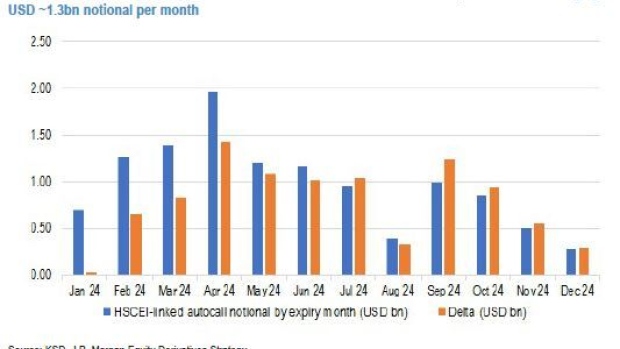Feb 5, 2024
Hong Kong Shares Face Risk From Expiring Korean Exotic Notes
, Bloomberg News

(Bloomberg) -- A $7.7 billion maturity wall for South Korean structured notes tied to Hong Kong stocks may lead to selling pressure on one of the worst-performing equity gauges in the world.
That’s the notional value of securities linked to the Hang Seng China Enterprises Index set to expire in the first half of this year, according to data from Korea’s Financial Supervisory Service. As the notes mature, Korean banks that sold the products will unwind hedges by exiting long positions in index futures.
The unwinding — which may create volatility and arbitrage opportunities — may have a negative impact of up to 10% on the HSCEI from its current level, according to estimates by Soujit Ghosh, Bloomberg APAC Lead for Equity Derivatives based on public data. While the expiries of the products are staggered, “collectively the selling will still have a dampening and negative impact on the HSCEI index,” he said.
The looming pressure from the Korean banks forms another dark cloud over Chinese stocks, which have suffered a meltdown again in recent weeks due to persistent economic pessimism and a lack of potent rescue measures. A total of 15.4 trillion won ($11.6 billion) worth of these products, or nearly 80% of all outstanding HSCEI-linked structured notes in Korea, are set to mature by the end of this year, according to the Financial Supervisory Service.
To be sure, while the unwinding of positions by Korean banks is a headwind for Hong Kong stocks, the impact will likely be moderate given “the ample liquidity in the Hong Kong futures market,” said Jun Gyun, a derivatives analyst at Samsung Securities Co.
Sold by Korean banks at the peak of Hong Kong’s stock market in early 2021, these equities-linked securities are at risk of massive capital losses as the HSCEI has since more than halved. Investors will likely suffer a net loss of around $3.6 billion, retrieving less than 50% of their initial capital, as the underlying index is unlikely to rebound enough to avoid triggering the losses, Ghosh said.
For ELS buyers, the investment equals the combination of selling a put option and receiving fixed income. For issuers, their exposure is similar to buying a put option. That requires them to hedge by taking a long position in the underlying asset, a bet they need to unwind when the structured notes expire.
©2024 Bloomberg L.P.






